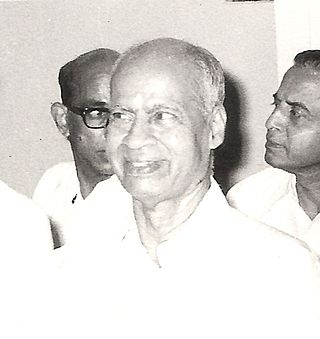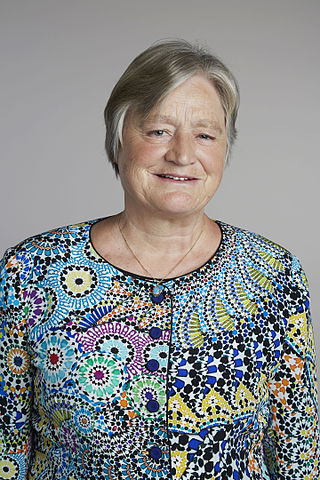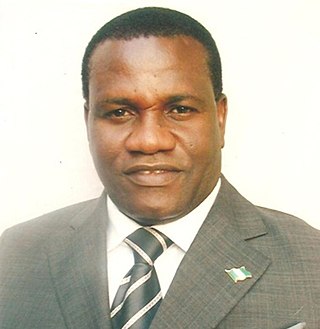
Bert Rickard Johannes Bolin was a Swedish meteorologist who served as the first chairman of the Intergovernmental Panel on Climate Change (IPCC), from 1988 to 1997. He was professor of meteorology at Stockholm University from 1961 until his retirement in 1990.
The Carl-Gustaf Rossby Research Medal is the highest award for atmospheric science of the American Meteorological Society. It is presented to individual scientists, who receive a medal. Named in honor of meteorology and oceanography pioneer Carl-Gustaf Rossby, who was also its second (1953) recipient.

Vilhelm Friman Koren Bjerknes was a Norwegian physicist and meteorologist who did much to found the modern practice of weather forecasting. He formulated the primitive equations that are still in use in numerical weather prediction and climate modeling, and he developed the so-called Bergen School of Meteorology, which was successful in advancing weather prediction and meteorology in the early 20th century.

Sir John Theodore Houghton was a Welsh atmospheric physicist who was the co-chair of the Intergovernmental Panel on Climate Change's (IPCC) scientific assessment working group which shared the Nobel Peace Prize in 2007 with Al Gore. He was lead editor of the first three IPCC reports. He was professor in atmospheric physics at the University of Oxford, former Director General at the Met Office and founder of the Hadley Centre.
Fredrick Kenneth Hare, was a Canadian climatologist and academic, who researched atmospheric carbon dioxide, climate change, drought, and arid zone climates and was a strong advocate for preserving the natural environment.

Pisharoth Rama Pisharoty was an Indian physicist and meteorologist, and is considered to be the father of remote sensing in India.

Andrew John Pitman is a British-Australian atmospheric scientist.

Jagadish Shukla is an Indian meteorologist and Distinguished University Professor at George Mason University in the United States.

Eugenia Enriqueta Kalnay was an Argentine meteorologist and a Distinguished University Professor of Atmospheric and Oceanic Science, which is part of the University of Maryland College of Computer, Mathematical, and Natural Sciences at the University of Maryland, College Park in the United States.

Warren Morton Washington was an American atmospheric scientist, a chair of the National Science Board, and a Distinguished Scholar at the National Center for Atmospheric Research (NCAR) in Boulder, Colorado. His research was part of the United Nations Intergovernmental Panel on Climate Change that shared the 2007 Nobel Peace Prize with Al Gore. In 2019, he was awarded the Tyler Prize for Environmental Achievement.

Joanna Dorothy Haigh is a British physicist and academic. Before her retirement in 2019 she was Professor of Atmospheric Physics at Imperial College London, and co-director of the Grantham Institute – Climate Change and Environment. She served as head of the department of physics at Imperial College London. She is a Fellow of the Royal Society (FRS), and a served as president of the Royal Meteorological Society.
The Grantham Institute – Climate Change and Environment is one of five global institutes at Imperial College London and one of three Grantham-sponsored centres in the UK. The institute was founded in 2007 with a £12m donation from the Grantham Foundation for the Protection of the Environment, an organisation set up by Hannelore and Jeremy Grantham.

Julia Mary Slingo is a British meteorologist and climate scientist. She was Chief Scientist at the Met Office from 2009 until 2016. She is also a visiting professor in the Department of Meteorology at the University of Reading, where she held, prior to appointment to the Met Office, the positions of Director of Climate Research in the Natural Environment Research Council (NERC) National Centre for Atmospheric Science and founding director of the Walker Institute for Climate System Research.

Ernest Asi Afiesimama is a Nigerian environmental and climate scientist who has worked for the Nigerian Meteorological Agency and was a consultant in environmental and climate affairs at Stern Integrated Projects He was also the Coordinator of Save Nigerian Environment Initiative. He currently works with the World Meteorological Organization.
Sreedharan Krishnakumari Satheesh is an Indian meteorologist and a professor at the Centre for Atmospheric and Oceanic Sciences of the Indian Institute of Science (IISc). He holds the chair of the Divecha Centre for Climate Change, a centre under the umbrella of the IISc for researches on climate variability, climate change and their impact on the environment. He is known for his studies on atmospheric aerosols and is an elected fellow of all the three major Indian science academies viz. Indian Academy of Sciences Indian National Science Academy and the National Academy of Sciences, India as well as The World Academy of Sciences. The Council of Scientific and Industrial Research, the apex agency of the Government of India for scientific research, awarded him the Shanti Swarup Bhatnagar Prize for Science and Technology, one of the highest Indian science awards for his contributions to Earth, Atmosphere, Ocean and Planetary Sciences in 2009. He received the TWAS Prize of The World Academy of Sciences in 2011. In 2018, he received the Infosys Prize, one of the highest monetary awards in India that recognize excellence in science and research, for his work in the field of climate change.

Peter John Webster is a meteorologist and climate dynamicist relating to the dynamics of large-scale coupled ocean-atmosphere systems of the tropics, notably the Asian monsoon. Webster holds degrees in applied physics, mathematics and meteorology. Webster studies the basic dynamics of the coupled ocean-atmosphere system in the tropics and has applied this basic knowledge to developing warning systems for extreme weather events in Asia. He has served on a number of prestigious national and international committees including the World Climate Research Program's Joint Scientific Committee (1983-1987), chaired the international Tropical Ocean Global Atmospheric (TOGA) organizing committee (1988–94) and was co-organizer of the multinational TOGA Couple Ocean-Atmosphere (1993). He is Emeritus Professor in Earth and Atmospheric Sciences at Georgia Institute of Technology and co-founder and Chief Scientist of Climate Forecast Applications Network LLC, a weather and climate services company.
Amanda H. Lynch is an atmospheric scientist and Sloan Lindemann and George Lindemann, Jr. Distinguished Professor of Environment and Society and Professor of Earth, Environmental and Planetary Sciences at Brown University. She was founding Director of the Institute at Brown for Environment and Society in 2014. She is an expert in polar climate system modelling, indigenous environmental knowledge and climate policy analysis.

Roy Michael Harrison is a British environmental scientist. He has been Queen Elizabeth II Birmingham Centenary Professor of Environmental Health at the University of Birmingham since 1991, and is a distinguished adjunct professor at King Abdulaziz University in Jeddah, Saudi Arabia.
The Rodwell–Hoskins mechanism is a hypothesis describing a climatic teleconnection between the Indian/Asian summer monsoon and the climate of the Mediterranean. It was formulated in 1996 by Brian Hoskins and Mark J. Rodwell [d]. The hypothesis stipulates that ascending air in the monsoon region induces atmospheric circulation features named Rossby waves that expand westward and interact with the mean westerly winds of the midlatitudes, eventually inducing descent of the air. Descending air warms and its humidity decreases, thus resulting in a drier climate during the summer months. The interaction of this atmospheric flow with topography further modifies the effect.
Kyung-Ja Ha is a climate physicist from South Korea. She has been a professor in the Department of Atmospheric Science at Pusan National University since 1994 and leads the Global Monsoon Climate Lab (GMCL). Her research interests include climate physics, monsoon dynamics, planetary boundary layer modeling, hydroclimate, and tropical-extratropical interaction. Prof. Ha's work has been cited about 7,000 times, with an h-index of 44 and an i10-index of 153. She served as president of the Korean Meteorological Society from 2022 to 2023, and has been involved in advisory roles at the Presidential Advisory Council on Science and Technology of South Korea(2022~2023). Currently, she is co-chair of the Expert Team on Climate Impact on Monsoon Weather in the WMO/WWRP Monsoon Panel since 2017, executive editor at Climate Dynamics Journals since 2021, and chair of the Local Advisory Committee of the 2024 Asia Oceania Geosciences Society. Through her research and leadership roles, she has contributed to the understanding of monsoon systems and climate dynamics.












